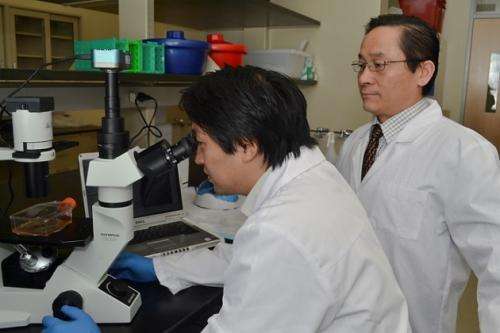Embryonic stem cells offer treatment promise for multiple sclerosis

Scientists in the University of Connecticut's Technology Incubation Program have identified a novel approach to treating multiple sclerosis (MS) using human embryonic stem cells, offering a promising new therapy for more than 2.3 million people suffering from the debilitating disease.
The researchers demonstrated that the embryonic stem cell therapy significantly reduced MS disease severity in animal models, and offered better treatment results than stem cells derived from human adult bone marrow.
The study was led by ImStem Biotechnology Inc. of Farmington, Conn., in conjunction with Advanced Cell Technology (ACT) Inc. of Massachusetts. ImStem was founded in 2012 by UConn doctors Xiaofang Wang and Ren-He Xu, along with Yale University doctor Xinghua Pan and investor Michael Men.
"The cutting-edge work by ImStem, our first spinoff company, demonstrates the success of Connecticut's Stem Cell and Regenerative Medicine funding program in moving stem cells from bench to bedside," says Professor Marc Lalande, director of the UConn's Stem Cell Institute.
"Connecticut's investment in stem cells, especially human embryonic stem cells, continues to position our state as a leader in biomedical research," says Gov. Dannel P. Malloy. "This new study moves us one step closer to a stem cell-based clinical product that could improve people's lives."
The researchers compared eight lines of adult bone marrow stem cells to four lines of human embryonic stem cells. All of the bone marrow-related stem cells expressed high levels of a protein molecule called a cytokine that stimulates autoimmunity and can worsen the disease. All of the human embryonic stem cell-related lines, on other hand, expressed little of the inflammatory cytokine.
Another advantage of human embryonic stem cells is that they can be propagated indefinitely in lab cultures and provide an unlimited source of high quality mesenchymal stem cells – the kind of stem cell needed for treatment of MS, the researchers say. This ability to reliably grow high quality mesenchymal stem cells from embryonic stem cells represents an advantage over adult bone marrow stem cells, which must be obtained from a limited supply of healthy donors and are of more variable quality.
"These great advantages perfectly match the requirements for pipeline production and quality control of clinical grade mesenchymal stem cells as a potential therapy for autoimmune diseases like multiple sclerosis, inflammatory bowel disease, rheumatoid arthritis, and type-1 diabetes," says Xu, corresponding author and one of the few scientists in the world to have generated new human embryonic stem cell lines.
There is no cure for MS, a chronic neuroinflammatory disease in which the body's immune system eats away at the protective sheath called myelin that covers the nerves. Damage to myelin interferes with communication between the brain, spinal cord, and other areas of the body. Current MS treatments only offer pain relief, and slow the progression of the disease by suppressing inflammation.
"The beauty of this new type of mesenchymal stem cells is their remarkable higher efficacy in the MS model," says Wang, chief technology officer of ImStem.
The group's findings appear in the current online edition of Stem Cell Reports, the official journal of the International Society for Stem Cell Research. ImStem is currently seeking FDA approval necessary to make this treatment available to patients.
The research was supported by a $1.13 million grant from the state of Connecticut's Stem Cell Research Program.
More information: "Human ESC-Derived MSCs Outperform Bone Marrow MSCs in the Treatment of an EAE Model of Multiple Sclerosis." Xiaofang Wang, Erin A. Kimbrel7, Kumiko Ijichi, Debayon Paul, Adam S. Lazorchak, Jianlin Chu, Nicholas A. Kouris, Gregory J. Yavanian, Shi-Jiang Lu, Joel S. Pachter, Stephen J. Crocker, Robert Lanzaemail, Ren-He Xuemail. Stem Cell Reports April 14, 2014. DOI: dx.doi.org/10.1016/j.stemcr.2014.04.020
















